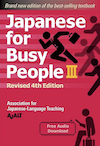初級日本語3レベルの内容
- 対象
-
- 初級1と2の学習が済み、さまざまな状況で自分自身のことを表現できるレベルに達している方
- また、動詞の活用形である辞書形、て形、ない形、仮定形、可能形、意向形を学習済みであることが必要です。
- 学習内容
-
- 会話を中心に学びます。また、ご希望により320字の漢字も学びます。
- 仮定条件の表現方法、伝言の残し方・伝え方、受身形、使役形、敬語、自動詞、他動詞など。
- ビジネス日本語の基本
- 教科書
- "Japanese for Busy People Vol.3" (by Kodansha International)

- プログラム
- 標準的な必要レッスン数: 90分レッスン × 54回(学習者の状況、レッスンの頻度、1回のレッスン時間によって異なります)
| 課 | 文法のポイント |
|---|---|
| 1 | ~ようです。/~みたいです。 (seems ...; like ...) [sound/voice/smell/taste]がします。 くれます。 (give to me) |
| 2 | ~てあげます/~てくれます/~てもらいます。 ~ようになります。 (become able to ...) |
| 3 | ~く/に します。 (describing making change) ~すぎます。 (too ...) [exceeding] ~ようにします。 (try to ...; make sure to ...) |
| 4 | ~そうです。 (I heard ...; I read ...) ~ために (in order to ...) [purpose] ~て/~ないで・~ずに (with/without ...ing) |
| 5 | ~こと [nominalizing sentences] ~ておきます。 [preparatory actions] ~てあります。 [result of an intentional act] |
| 6 | ~まま [expressing a situation that remains unchanged] ~おかげで (thanks to ...) / ~せいで(due to ...) / ~ため(に) [cause] ~と、いいです。 (It would be nice if ...) |
| 7 | うけみ ① [passive structures whose subject is an object] ~べきです。 (ought to ...; should ...) |
| 8 | うけみ ② [passive structures whose subject is a person] ~てはいけません。 [prohibit] ~という~ (... named/called ...) |
| 9 | くるかどうか わかりません。 [quoted yes/no question] いつ くるか わかりません。 [quoted question] ~ことができます。 (can ...; be able to ...) |
| 10 | ~ても/~でも (even if ...) [いつ/どこ/なに/だれ/どんな/いくら] +ても めいれいけい [imperative form] 「のめ、のむな」「たべろ、たべるな」 |
| 11 | ~らしいです。 (seems ...) ~ように、~。 (so that ...; so as to ...) ~たばかり (have just ...; just ...) |
| 12 | ~やすい/~にくい (easy to ... /difficult to ...) ~ほど~ない (not as ... as ...) ~ば~ほど (the more ... the more ...) |
| 13 | ~はずです。 (should ...; ought to ...) ~のに (in spite of ...) |
| 14 | ~(よ)うとします。 (be about to ...) ~つもりです。 (intend to ...) |
| 15 | ~ています/~ていました。 [state in effect] ~ところです。 [expressing the stage of action] |
| 16 | しえき [causative structures] しえきうけみ [causative-passive structures] |
| 17 | ~のに [expressing usefulness and purpose] ~てほしいです。 (want someone to do ...) ~たがっています。 ([third person] wants to ...) |
| 18 | ~ことにします。 (I decide to ...) ~ことになります。 (be decided to ...) ~わけです。 (that’s why ...) 「ふえます+はじめました」→「ふえはじめました」 [verb + verb] |
| 19 | けいご① 「いらっしゃいます」(とくべつなけいご) [honorific expressions] けいご② 「お~になります」 [honorific expressions] ~ようにいいます。 (tell someone to do ...) |
| 20 | ~たら~ました。 [unexpected; surprise; result] ~てしまいました。 [regret or completion] |
| 21 | けいご③ 「もうします」(とくべつなけいご) [humble expressions] けいご④ 「お~します」 [humble expressions] けいご⑤ 「です」→「ございます」 [polite expressions] |
| 22 | それで/そこで/いっぽう/それに/そして/それから/また まず/はじめに/つぎに/それから |
| 23 | まったく~ない/すこしも~ない/ちっとも~ない/けっして~ない/なかなか~ない |
| 24 | Formal words わたし → わたくし、きのう → さくじつ |